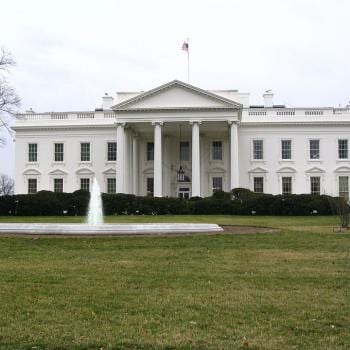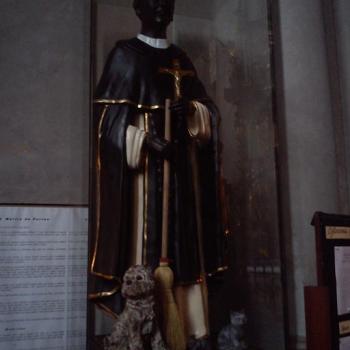I received the following reflection second hand via email. It comes from a Catholic Worker email list, and is a lecture by Jim Forest, a long time member of the Catholic Worker, biographer of Dorothy Day, and friend of Thomas Merton. I find his comments about compassion and peace-making to be very pertinent given the divisions in the world today, which is why I thought it appropriate to share on Vox Nova.
Despite his physical distance from centers of protest activity, Merton was quite able to relate to those in the thick of protest thanks to his vivid memories of equivalent activities from his student days at Columbia University in New York City. “I have the feeling of being a survivor of the shipwrecked thirties,” he wrote me early in 1963, “one of the few that has kept my original face before this present world was born.”
What he found was often missing among protesters was compassion. Those involved in protests tend to become enraged with those they see as being responsible for injustice and violence and even toward those who uphold the status quo, while at the same time viewing themselves as models of what others should be. But without compassion, Merton pointed out, the protester tends to become more and more centered in anger, becomes a whirlpool of self-righteousness, and even becomes an obstacle to changing the attitudes of others rather than someone who helps open the door to conversion. As he put it in one letter:
“We have to have a deep patient compassion for the fears … and irrational mania of those who hate or condemn us. These are, after all, the ordinary people, the ones who don’t want war, the ones who get it in the neck, the ones who really want to build a decent new world in which there will not be war and starvation.”
Most people, Merton pointed out, are irritated or frightened by agitation even when it protests something — militarism, nuclear weapons, social injustice — which objectively endangers them. As he put it:
“[People] do not feel at all threatened by the bomb … but they feel terribly threatened by some … student carrying a placard.”
Compassion was again stressed by Merton during a small retreat for peacemakers that he hosted in November 1964. He raised a provocative question: “By what right to we protest?” It wasn’t a question I had ever before considered. I was born into a family in which protest was a normal activity. While not by nature a person drawn to protest, as a young adult I found myself seeing protest as an unfortunate necessity. I could not watch preparations for nuclear war and fail to raise a dissenting voice or refuse to participate in actions of resistance. To protest was a duty, period. But by raising the “by what right” question, Merton forced me to consider that protest, if it is to have any hope of constructive impact on others, has to be undertaken not only with great care but with a genuine sympathy for those who object to one’s protest, who feel threatened and angered by it, who regard you as a traitor. After all, what we are seeking is not just to make some noise but to help others think freshly about our social order and the direction we’re going.
When compassion and love are absent, Merton insisted, actions that are superficially nonviolent tend to mask deep hostility, contempt and the desire to defeat and humiliate an opponent. As he wrote in one of his most profound and insightful letters:
“One of the problematic questions about nonviolence is the inevitable involvement of hidden aggressions and provocations. I think this is especially true when there are … elements that are not spiritually developed. It is an enormously subtle question, but we have to consider the fact that, in its provocative aspect, nonviolence may tend to harden opposition and confirm people in their righteous blindness. It may even in some cases separate men out and drive them in the other direction, away from us and away from peace. This of course may be (as it was with the prophets) part of God’s plan. A clear separation of antagonists…. [But we must] always direct our action toward opening people’s eyes to the truth, and if they are blinded, we must try to be sure we did nothing specifically to blind them.
“Yet there is that danger: the danger one observes subtly in tight groups like families and monastic communities, where the martyr for the right sometimes thrives on making his persecutors terribly and visibly wrong. He can drive them in desperation to be wrong, to seek refuge in the wrong, to seek refuge in violence…. In our acceptance of vulnerability … we play [on the guilt of the opponent]. There is no finer torment. This is one of the enormous problems of our time … all this guilt and nothing to do about it except finally to explode and blow it all out in hatreds — race hatreds, political hatreds, war hatreds. We, the righteous, are dangerous people in such a situation…. We have got to be aware of the awful sharpness of truth when it is used as a weapon, and since it can be the deadliest weapon, we must take care that we don’t kill more than falsehood with it. In fact, we must be careful how we “use” truth, for we are ideally the instruments of truth and not the other way around.”
Merton noticed that peace activists sometimes identify too much with sectarian ideologies or with particular political parties. In his view peace activity should communicate liberating possibilities to others, left, right and center. As he put it to me in one letter:
“It seems to me that the basic problem is not political, it is apolitical and human. One of the most important things is to keep cutting deliberately through political lines and barriers and emphasizing the fact that these are largely fabrications and that there is another dimension, a genuine reality, totally opposed to the fictions of politics: the human dimension which politics pretends to arrogate entirely [to itself]…. This is the necessary first step along the long way … of purifying, humanizing and somehow illuminating politics.”
* * *
An essay that includes much more from Merton on this topic:
For an in-depth treatment, see my book, “The Root of War is Fear: Thomas Merton’s Advice to Peacemakers”:
* * *












